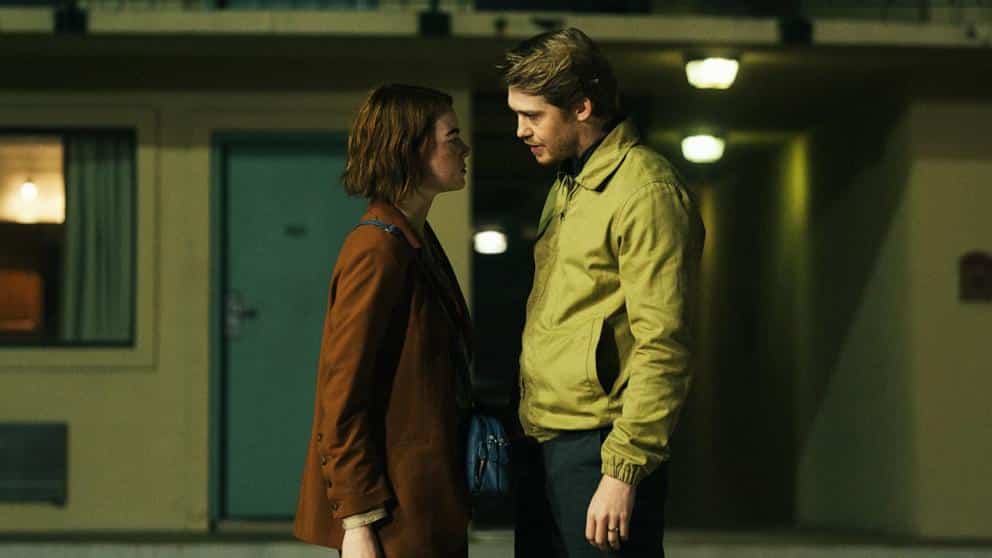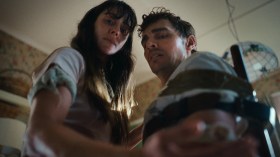In 2024, the Sydney Film Festival’s Official Competition will celebrate 16 years of awarding the prestigious Sydney Film Prize to each year’s most ‘audacious, cutting-edge and courageous’ film.
Presented at the Closing Night awards ceremony at the State Theatre, the Sydney Film Prize (a cash prize of $60,000) will be awarded to one of the twelve local and international films that are officially competing in the festival – a number of which are fresh from Cannes competition.
The SFF competition is endorsed by FIAPF, the regulating body for international film festivals, and is judged by a jury of filmmakers and industry professionals, with the 2024 Official Competition Jury led by Bosnian writer and director Danis Tanović as Jury President, joined by Indonesian director Kamila Andini, Australian producer Sheila Jayadev, US producer Jay Van Hoy, and Australian director Tony Krawitz.
The documentary Midnight Oil: The Hardest Line, directed by Paul Clarke, is the only Australian film in the line-up.
Past winners have included The Mother of All Lies (2023), Close (2022), There is No Evil (2021), Parasite (2019).
This year, the films in the Official Competition are as follows:
SFF Official Competition 2024
All We Imagine As Light
Director: Payal Kapadia
Country: France, India, Netherlands, Luxembourg
Genre: Drama
Synopsis: ‘The first Indian film to appear in the Cannes Competition in 30 years, Payal Kapadia’s dreamy romantic drama follows two women in Mumbai who are thwarted in their quests for love but retain hope.
‘In Mumbai, Nurse Prabha’s routine is troubled when she receives an unexpected gift from her estranged husband. Her younger roommate, Anu, tries in vain to find a spot in the city to be intimate with her boyfriend. A trip to a beach town allows them to find a space for their desires to manifest.
‘Kapadia won the Golden Eye for Best Documentary at Cannes in 2021 for her hybrid film, A Night of Knowing Nothing. Here, in her first fiction film, she delivers on that great promise. Kapadia captures the city of Mumbai in an observational and dreamlike manner, revelling in the lives and dreams of two women in their search for love.’
Dying
Director: Matthias Glasner
Country: Germany
Genre: Dramedy
Synopsis: ‘Winner of the Silver Bear in Berlin, this multi-generational epic follows a conductor and his turbulent family. Equally funny and poignant, it’s anchored by a superb performance from Lars Eidinger (Personal Shopper, SFF 2016).
‘Eidinger plays Tom Lunies, a conductor in Berlin who is busy with a new composition, called ‘Sterben’ – or ‘Dying’ – written by his close and increasingly unstable friend Bernard (Robert Gwisdek). Tom is on the verge of fatherhood; his ex-girlfriend wishes him to co-parent her child, even though he is not the biological father. Meanwhile Tom’s hard-partying sister, Ellen (Lilith Stangenberg), has just embarked on an affair with a married colleague (Ronald Zehrfeld; Barbara, SFF 2012), and rarely checks in on the pair’s aged parents, Lissy and Gerd (Corinna Harfouch and Hans-Uwe Bauer). But the chaos and indignities of life make a family reunion unavoidable. Brilliantly performed by the ensemble, Dying is an exceptionally emotional film that, in spite of its title, is all about living.
Grand Tour
Director: Miguel Gomes
Country: Portugal, Italy, France
Genre: Drama/Experimental
Synopsis: ‘Direct from the Cannes Competition, the latest from Miguel Gomes (Tabu, SFF 2012; Arabian Nights, Sydney Film Prize, SFF 2015) is a melancholic and mischievous chronicle of a romantic pursuit across Asia.
‘Rangoon, Burma, 1917. A British civil servant, Edward (Gonçalo Waddington) is due to be married to his fiancée Molly (Crista Alfaiate), who has arrived from London for the wedding. But Edward panics before the nuptials and flees to Singapore. So begins his grand tour of Asia – whizzing through Bangkok, Manila, Saigon, Osaka and Shanghai. Molly is not easily dissuaded, however; determined to be married, she’s even rather amused by Edward’s cowardly skittishness. She sets off in pursuit, often narrowly missing her betrothed and sending telegrams notifying him of her progress. The word “stop” in her telegrams is both punctuation and an order. And while on the trail, Molly, with her boisterous laugh, is not short of admirers. With hilarious voiceover narration, and the dazzlingly beautiful and meticulous period scenes intercut with vibrant contemporary footage, Gomes has once again made a film that is funny, unique and beguiling.’
Kinds of Kindness
Director: Yorgos Lanthimos
Country: Ireland, UK, US
Genre: Drama/Comedy
Synopsis: ‘This Cannes Competition contender from Yorgos Lanthimos (Alps, Sydney Film Prize 2012; Poor Things) is a darkly hilarious triptych fable starring Emma Stone, Jesse Plemons and Willem Dafoe.
‘The opening chapter of Kinds of Kindness follows a man who appears to lead a very happy and successful life. But we soon learn that he is in an iron grip – when he rebels and tries to take back control, the odds are stacked against him. Next, a cop is relieved when his wife, lost at sea while conducting research, is rescued. But then he becomes convinced that she is not who she says she is – that a doppelganger has returned in her place. Finally, a duo conducts a search for a person with a very particular skill to occupy an elevated position in a spiritual sect seemingly built on sex. Reuniting with writing collaborator Efthymis Filippou (Dogtooth, The Lobster), Lanthimos explores three transgressive and bizarre scenarios, with surreal twists and turns along the way. Stone, Plemons and Dafoe are joined by a brilliant group of players – Hong Chau, Joe Alwyn, Mamoudou Athie and Hunter Schafer – in these strange, surprising and subversive tales.’
Kneecap
Director: Rich Peppiatt
Country: Ireland, UK
Genre: Comedy
Synopsis: ‘Rich Peppiatt’s raucous, rude and riotously entertaining comedy stars three real-life Belfast rappers as themselves – and Michael Fassbender. Audience Award, Sundance NEXT strand.
‘Peppiatt’s powerfully political comedy-drama about the survival of the Irish language is something of a miracle movie. Where else in the world could the legacy of trauma produce such hilarity and crowd-pleasing entertainment? Liam Óg Ó hAnnaidh and Naoise Ó Cairealláin play themselves wonderfully in the origin story of their Belfast rap group Kneecap. We first meet them in the 2010s as drug-selling besties. More importantly, they’re staunch patriots who speak Irish as an act of cultural maintenance, and in defiance of British imperialism. When nerdy music teacher JJ Ó Dochartaigh enters the scene, he encourages the lads to turn their notebook scribblings into highly charged polemical rap songs (and becomes their DJ). What follows is a rowdy and cheerfully rude showbiz story following the trio through drug-hazed nights and clear-eyed days, as their music begins to impact the broader community while inevitably angering authorities. Subversive, sexy, unfiltered, and with a significant supporting role for Michael Fassbender, this freewheeling and finger-flipping music biopic hits all the right notes.’
Read: Sydney Film Festival launches 2024 program – here’s what you should see
Marcello Mio
Director: Christophe Honoré
Country: France, Italy
Genre: Comedy
Synopsis: ‘Christophe Honoré’s inventive Cannes Competition entry brings together an all-star French cast (playing themselves) in this delightfully meta comedy paying homage to the great Marcello Mastroianni.
‘Chiara Mastroianni, the daughter of Marcello Mastroianni (La Dolce Vita, 8½) and Catherine Deneuve (Belle de Jour, The Umbrellas of Cherbourg), is an actress disillusioned with the business. The shoot she’s on is absolutely chaotic and unpleasant. When she auditions for a role in a new film, she’s told by the director: ‘More Mastroianni than Deneuve … More Marcello than Catherine.’ She starts to feel she might prefer to live her father’s life, leading to Chiara beginning to dress and speak like him – and then insisting on being called Marcello. Her mother (Deneuve herself) reacts with bemusement and concern, but others (like actor Fabrice Luchini) go with the flow. Soon, Chiara is in Rome, retracing Marcello’s steps but also on a path to re-finding herself. Reimagining some of Marcello Mastroianni’s iconic roles, Marcello Mio is a playful depiction of the challenges and joys of the creative life under the shadow of famous parents.’
Midnight Oil: The Hardest Line
Director: Paul Clarke
Country: Australia
Genre: Documentary
Synopsis: ‘Legendary music and activism are front and centre in this exciting documentary, created with unfettered access to seminal Australian rock band Midnight Oil, who emerged from politically charged 1970s Sydney to become global icons.
Across a 45-year career ‘The Oils’ helped shape modern Australia with anthems like ‘US Forces’, ‘Beds Are Burning’ and ‘Redneck Wonderland’. Featuring unseen footage and interviews with every band member, alongside signature moments including the outback tour with Warumpi Band, their Exxon protest gig in New York and those famous ‘Sorry’ suits at the Sydney Olympics, Midnight Oil: The Hardest Line traces the journey of Australia’s quintessential rock band.’
Puan
Director: María Alché, Benjamín Naishtat
Country: Argentina, Italy, France, Germany, Brazil
Genre: Comedy
Synopsis: ‘In this hilarious, incisive comedy, a philosophy professor at a Buenos Aires university is threatened by a charismatic rival. As their battle spirals out of control, so does their nation.
‘Puan is the name of the street on which the Faculty of Philosophy and Literature of the University of Buenos Aires is located. Marcelo (Marcelo Subiotto) has dedicated his life to teaching philosophy there – and to the service of his mentor, Professor Caselli. When Caselli dies suddenly, Marcelo expects to continue his legacy and be appointed his replacement. Enter Rafael (Leonardo Sbaraglia): handsome and charismatic, he returns from prestigious European universities and becomes an immediate competitor for the role. As the two men attempt to outdo each other, the institution appears to be on the verge of collapse, and maybe the nation around them is too. At once hilarious comedy and devastating portrait of an economy and nation on the brink, Puan poses vital questions about what is truly important. Directors María Alché and Benjamín Naishtat say: ‘We see this film as a complex and dynamic experience in which the audience participates in a kind of Chaplinesque hilarity while, at the same time, asking questions regarding identity, existence, [and] the future.”
September Says
Director: Ariane Labed
Country: France, Greece, Ireland, Germany, UK
Genre: Drama
Synopsis: ‘Acclaimed actor Ariane Labed (Attenberg, SFF 2011; Alps, SFF 2012) makes her directorial debut with this Cannes-selected Gothic psychological drama, in which the closeness of two sisters becomes increasingly disruptive.
‘Teenage sisters July (Mia Tharia) and September (Pascale Kann) are extremely close. So entwined that they seem to require no one else. They tolerate their single mother, Sheela (Rakhee Thakrar, Sex Education), but even at school, the duo’s interactions with the other students are mostly acrimonious. Born just 10 months apart, September is extremely protective of July, but she also expects her sister to follow every instruction, however unreasonable. When July begins to exert her independence and acts on the attraction she feels for a boy at school, things take a bad turn. Mother and daughters decamp to an old family home in Ireland, where the bond between July and September takes on new, increasingly heightened dimensions. In her visually inventive, atmospheric and surreal debut, director Ariane Labed explores these familial ties – and a love so intense it transforms reality.’
Sujo
Director: Astrid Rondero, Fernanda Valadez
Country: Mexico, USA, France
Genre: Drama
Synopsis: ‘Winner of the Sundance Grand Jury Prize, Sujo is unlike anything you’d expect from a Mexican cartel drama, as it follows a cartel-born child from infancy to manhood in an epic life-affirming odyssey.
‘Sujo is orphaned when his assassin father is murdered by his own cartel. Even though he’s only four, the boy is considered a liability, and the cartel orders his death to ensure there’ll be no reprisals to worry about in the future. But young Sujo is protected by his aunt, growing up in the isolated countryside. The spectre of the cartel is never far away, however: Sujo reaches his teens and is tempted to join the local cartel, and even when he moves to the city, the world of violent criminality is never far away. Will he be drawn back to the life his father lived and died for? Directors Astrid Rondero and Fernanda Valadez create visually distinctive chapters as they tell this complex and immersive story. Comparisons to Richard Linklater’s Boyhood have been made, and the films are similar not only in that both follow the main character over many years, but also in the extreme empathy and concern each character elicits from the audience. As Rondero and Valadez put it: ‘In the end, the whole film is a portrait of this young man, Sujo. A portrait but also a promise of the man he deserves to be.”
There’s Still Tomorrow
Director: Paola Cortellesi
Country: Italy
Genre: Drama
Synopsis: ‘A box office phenomenon in its native Italy, where it outperformed Barbie and Oppenheimer, There’s Still Tomorrow is a moving, empowering melodrama about an industrious woman in post-WWII Rome.
‘Paola Cortellesi directs and stars in this crowd-winning gem as Delia, a wife and mother doing her best to get by in the scarred city following the war. Money is short and her husband, Ivano, is a violent brute who responds to her morning greeting by slapping her in the face. Delia juggles taking care of the home, three children, and a bedridden father-in-law, with scrambling for cash to contribute to the household – and to the pockets of the ever-demanding Ivano. Delia’s dream is for her daughter Marcella to marry well and lead a better, more comfortable life – the girl’s romance with a boy from a business-owning family bodes well. She finds respite from the violence in a flirtation with an old suitor, Nino (Vinicio Marchioni), and in an unlikely friendship with an American soldier she meets on the streets. A mysterious letter compels Delia to make a momentous, life-altering choice. ‘I wanted to make a contemporary movie set in the past, because I think that unfortunately many things have remained the same,’ Cortellesi said. Shot with visual panache in sparkling black and white and with a wonderful soundtrack, Cortellesi has succeeded in making a vibrant, vital film that can lead to change.’
Viet and Nam
Director: Trương Minh Quý
Country: Vietnam, Philippines
Genre: Drama
Synopsis: ‘Potently combining the mystical and the political, Cannes Un Certain Regard contender Việt And Nam is the mesmerising and visually resplendent love story of two gay mineworkers.
‘Nam and Việt work deep within the bowels of the earth – mining coal in the near dark and in very dangerous conditions. But even in the mines, the two find romantic and erotic moments together, always in the knowledge that they will soon be separated. Nam intends to leave his country and his lover to make a perilous journey to a new life in Europe. Nam is inspired by his cousin already in Europe who sends money back to his mother, so she can afford the best house in the village. But before he can make the move, he must help his mother find the remains of his soldier father – buried in an unknown location deep in the forest. While on this committed search, the past and present mystically connect. Shot on 16mm film by young auteur Trương Minh Quý, Việt And Nam is a tremendously beautiful and atmospheric film to behold, with the visuals matched by a great narrative boldness and confidence.’
Director Trương Minh Quý and producer Nguyễn Thị Xuân Trang will attend the SFF screenings of Viet and Nam.
The Sydney Film Festival runs from 5-16 June 2024. For more information, head to the official SFF website.





